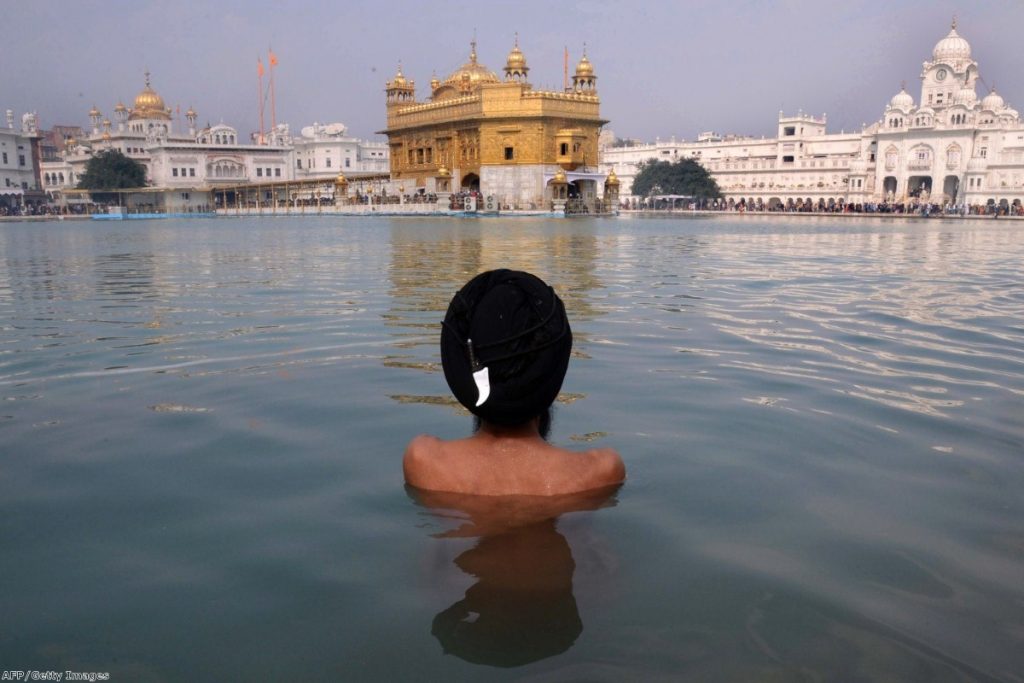Amritsar massacre: Sikh dismay as Hague brushes off SAS involvement
Advice provided by the SAS officer who helped the Indian government prepare for the 1984 Amritsar massacre had only "limited military impact", William Hague has told MPs.
The foreign secretary was updating MPs on the extent of Margaret Thatcher's involvement in the brutal removal of Sikh separatists from the Golden Temple in Amritsar, which left hundreds dead.
It follows documents released under the 30-year rule showing the British officer had advised the Indian government as it drew up plans for the removal of the separatists from the temple.
Documents from February 1984, four months before the Operation Bluestar attack on Amritsar of early June that year, show Thatcher was fully aware of the plans.


"The UK military officer's advice had limited military impact," Hague told MPs.
He said that assessment was consistent with comments from the Indian operational commander, "who had said no-one helped with the planning or execution of the planning".
"The nature of the UK's assistance was purely advisory and limited," Hague continued.
"There was no link between the provision of this advice and defence sales… there is no evidence of parliament being misled.
"It is a strength of our democracy that we are always prepared to take an unflinching look at the past but I hope this investigation… will provide reassurance to the Sikh community, this House and the public."
The SAS officer appears to have recommended a surprise helicopter-borne attack by paramilitary forces.
"Even to the non-expert on these matters, the military action was clearly very fundamentally different," Hague added.
"And so overall I think this is the right degree of transparency – a strong degree of transparency and a thoroughly good job by the Cabinet secretary."
Britain's Sikh community remains deeply dissatisfied, however, protesting only yesterday that the inquiry had been undertaken on "narrow terms".
"We are dismayed the terms of the review were only formally made available almost three weeks after the review was announced and only days before an announcement of the results of the review are expected in parliament," Sikh Federation chairman Bhai Amrik Singh said in a letter to David Cameron.
"It appears the review has looked at a narrow period and not covered the period in the latter half of 1984 and may not have addressed some of the concerns raised by UK politicians in the last three weeks, eg threat of sanctions by India against the UK, Germany, Canada and USA towards the end of 1984 for sympathising with Sikhs in the Diaspora.
"From the outset you have emphasised the need for transparency, but the significant delay in sharing the terms and that they appear to have been changed for political reasons does not bode well with such assertions and your emphasis on the speed of the review."
Many Sikhs in Britain believe the Indian government made threats to the UK, Germany, the US and Canada about imposing sanctions on the Sikh diaspora.
But Hague denied there had been any link between the military advice and any trade talks.
Labour backbencher Tom Watson, who led calls for an inquiry after details of British involvement in the Amritsar massacre emerged, called on Hague to apologise in the Commons chamber.
He pointed to Cabinet minutes discussing support for the quelling of unrest in India, quoting Cabinet minutes warning that "export contracts worth £5 billion could be at stake".
But the foreign secretary said today's report showed there was no link between the provision of military advice by Britain and "defence sales or any other policy issue".
In a letter to Hague dated January 14th, Watson wrote: "Parliament has the right to know where military operatives were deployed and there should be full disclosure of the facts surrounding this case.
"Was the Cabinet informed? Which ministers took the decision to give military support? How many personnel were involved? Was there a UK military presence in a operational, logistical, observational or advisory capacity during the siege at Amritsar?"
Dabinderjit Singh, a leading figure in the British Sikh community, wrote for Politics.co.uk on the massacre: "Up to 150,000 Indian army troops were sent to the northern Indian state of Punjab, the Sikh homeland, equipped with helicopter gunships and tanks.
"Over 125 other Sikh shrines were simultaneously attacked. On the false pretext of apprehending 'a handful of militants' lodged inside the Golden Temple, the Indian army unleashed a terror unprecedented in post-independence India.
"It took the use of Vijayanta tanks to win the fight for the army. These let loose a barrage of highly explosive shells, which destroyed the Akal Takht, the temporal seat of the Sikhs."
Cameron visited Amritsar, in the Indian state of Punjab, in February last year, where he expressed regret about the 1919 massacre carried out by British imperial troops.
He stated: "I don't think the right thing is to reach back into history and to seek out things you can apologise for. I think the right thing is to acknowledge what happened, to recall what happened, to show respect and understanding for what happened."












